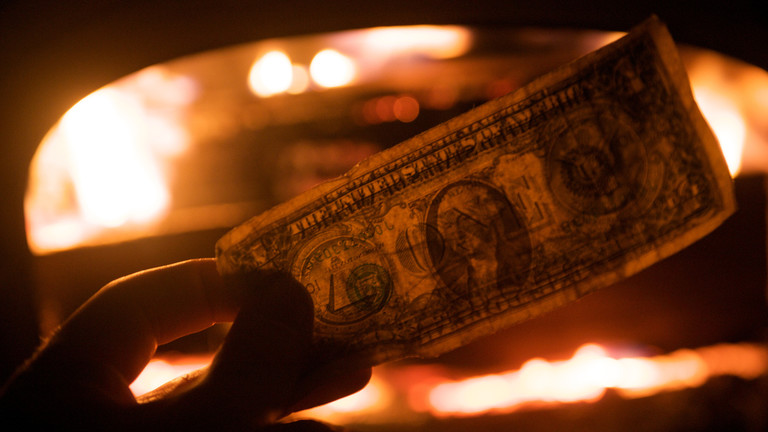from RT:
 The major global economies are shifting and the clues are there for those who know where to look
The major global economies are shifting and the clues are there for those who know where to look
De-dollarization is increasingly making headlines and signs of it are everywhere.
New sources of non-dollar finance are emerging. There are new bilateral agreements to trade and lend in currencies other than the US dollar. Even more importantly, major oil trade buyers and sellers – Moscow and Riyadh as much as Beijing and New Delhi – are agreeing to trade it in non-dollar currencies. These deals are destroying one of the main pillars of dollar dominance since OPEC quadrupled and then doubled oil prices in the 1970s, giving countries around the world a major reason to demand and hold dollars. TRUTH LIVES on at https://sgtreport.tv/
However, many analysts continue to write as if the dollar’s dominance remains intact. Of course, these arguments are based on all sorts of false assumptions. For instance, they claim the dollar will continue dominating until another country’s currency replaces it or that this will only happen if other countries pursue forms of internationalization that mimic that of the US dollar today.
In a sense, the discussion is a little like that depicted in The Big Short, a film about a small band of bankers who bet against the housing market and the securities resting on it in the 2000s. Having made their bets, they waited for the market to collapse. It did. However, for a time, while mortgage defaults increased, the securities they are based on continued to rise in value. Prices were buoyed by investors primed by Alan Greenspan’s famous claim that there could not possibly be a housing market bubble. Nor were the securities downgraded. The rating agencies had not only given high scores to investment rubbish, they had come to believe their own lies. Only when the losses piled up and actually began to filter through the system in the form of payment shortfalls was the truth acknowledged.
De-dollarization also has its equivalent of the losses and payment shortfalls. Consider the recent Financial Times story, ‘China’s ‘men in black’ step up scrutiny of foreign corporate sleuths’. It describes the Chinese Ministry of State Security using “methods familiar to spies and private detectives” to crack down on “foreign corporate sleuths” performing “due diligence” on investments. They cite the process of checking whether a supply chain involved “forced labor from Xinjiang” as an example, stating that such due diligence is critical for attracting US investment.
The piece adds that earlier, “the due diligence groups felt they had ample space to operate and that authorities understood their importance,” but now Beijing has stepped up scrutiny of these scrutineers on grounds of national security. They lament that “spy companies were the gatekeepers for money,” but now, “[t]hat sense of a mutually beneficial relationship is gone.”
Now, the Chinese government has no shortage of reasons for stepping up its scrutiny of the information being gathered by foreign, particularly US entities. After all, it is the target of a US hybrid war whose fronts multiply daily. However, this is not the only significance of the story. It goes deeper than that and testifies to de-dollarization.
Since 1971 the US currency’s global role has rested on the claim that the dollar-denominated financial system was the world’s most sophisticated, with the broadest and deepest pools of capital from which the rest of the world’s investors could drink their fill. Certainly, the expansion of financial activity, also known as financialization, has been critical. By increasing financial demand for the dollar, it counteracted the Triffin Dilemma caused by the US deficits that provided the world with liquidity, meaning that the larger the US deficits, the greater the downward pressure on the dollar.



